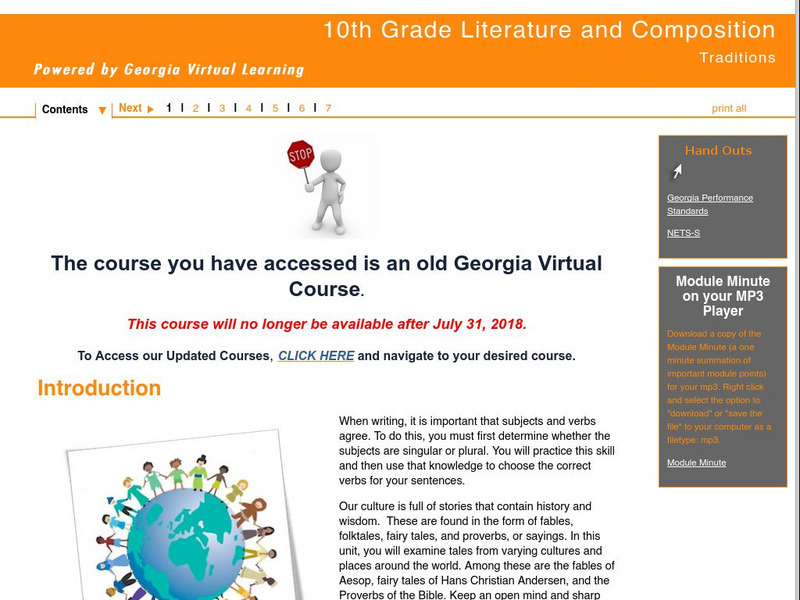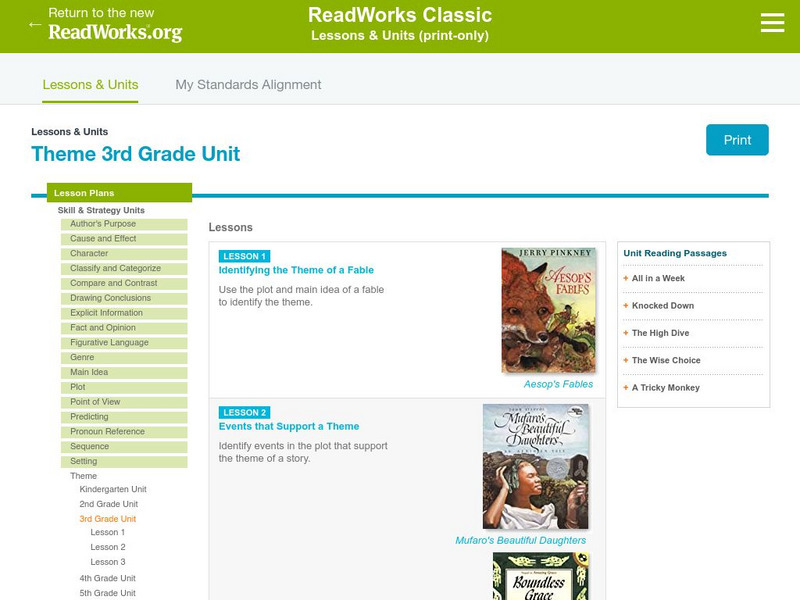Hi, what do you want to do?
Curated OER
Identifying the Theme in a Story
Students recognize Theme through the use of simple, short stories. Using Pro Quest, students begin by researching the literary element, theme, and how it can be identified. They then identify the themes in Aesop's Fables and...
Curated OER
Philanthropy in Literature
Students research philanthropy in three genres: a play, a fable, and a parable. Students read an Aesop fable and answer questions in groups. Students complete steps in two worksheets from 'The Good San Franciscan' and 'Someone Should.'...
Curated OER
Writing Fables
Students develop a working skill of using graphic organizers for writing. The lesson notes that the best kind of organizer is one that is engaging to the appropriate audience. The assessment follows the rubric given in the lesson.
Curated OER
Aristotle's Six Elements Of A Play
Fifth graders view the play, The Ant and the Grasshopper. They define Aristotle's six elements of a play. At the end of the instructional activity, 5th graders be asked to participate in the play by acting like busy ants. This...
School Specialty
The Tortoise and the Hare - Drawing Conclusions/Predictions Outcomes
Does the fastest one always win the race? Look deeper into The Tortoise and the Hare with a set of discussion questions for before, during, and after reading the story.
Curated OER
Stories That Really Add Up
Students, in groups, develop math lessons for younger students that each stems from a popular student story. Group members individually develop lessons for other subject areas based on their group's story, creating interdisciplinary units.
Curated OER
Studies of the Ancient World
Sixth graders, after taking a pretest, write a paragraph describing the difference between Athens and Sparta and write an article about the ancient Phoenicians, describing their contributions to world history. They compare democracy in...
Curated OER
Understanding Cultural Diversity
First graders examine different types of art to help them explain the idea of cultural diversity. This is a unit focusing on works of art.
Curated OER
Small Actions with Big Results
Students explore philanthropy in literature. In this literature lesson, students read text from three different genres that all have a moral. Students compare and contrast these pieces of literature, focusing on the character traits that...
Curated OER
What is a Philanthropist?
Students discuss the conceptual framework of philanthropy. In this introduction to philanthropy lesson, students define the term philanthropist and read the story Lion and the Mouse. Students discuss the concepts of philanthropy...
Curated OER
Forecast Sunny and Warm
Students explore the concept of philanthropy. In this service learning lesson, students participate in hands-on activities that replicate building a foundation and providing for future generations.
Curated OER
Who's Got Game? The Lion or the Mouse?
Discuss bullying, folk tales, and more using this resource. Learners read the story The Lion and the Mouse by Toni and Slade Morrison, engage in cause and effect activities, make predictions, and discuss bullying. This is a motivating...
Curated OER
Town Mouse/ Country Mouse
Students recognize the difference between the city and the country. In this City Mouse, Country Mouse lesson, students listen to a story and describe and map differences between the city and the country. Students understand that people...
Curated OER
Storytelling
Eighth graders retell stories to peers and the entire class. In this storytelling lesson, 8th graders research short stories and select a short story to retell. Students rewrite the stories in their own words and tell it aloud.
Curated OER
Myth, Legend and Folklore
Students examine the role of myths and folklore in the Native American culture. They listen to examples of oral history and write their own. They share their story with the class.
John F. Kennedy Center
The Kennedy Center: Elements of Fables
This ArtsEdge unit on fables shows how to compare and contrast, read and write fables, and discuss the elements they contain. Has great links, definitions, and fable examples.
Georgia Department of Education
Ga Virtual Learning: 10th Grade Literature and Composition: Traditions
This is a unit on the traditional wisdom of various cultures handed down through fables, fairy tales, folklore, and proverbs. It includes readings from Aesop's Fables, African and African-American Folktales, Hans Christian Andersen's...
Read Works
Read Works: Grade 2: Two Lesson Unit: Theme
[Free Registration/Login Required] A set of two lesson plans designed to teach students to use story elements to identify theme and to match a given theme to a story. Lessons are based on the book Aesop's Fables by Jerry Pinkney....
Read Works
Read Works: Theme 3rd Grade Unit
[Free Registration/Login Required] This site provides a series of three lesson plans designed to teach students to identify and support the theme of a fable and a fiction selection based on main idea and supporting details. Lessons are...
English Club
English Club: Classic Reading
This EnglishClub collection shares several classical works of literature leveled for elementary, intermediate, advanced, Shakespeare, and author information. These include various readings from William Shakespeare, Aesop, Rudyard...
























